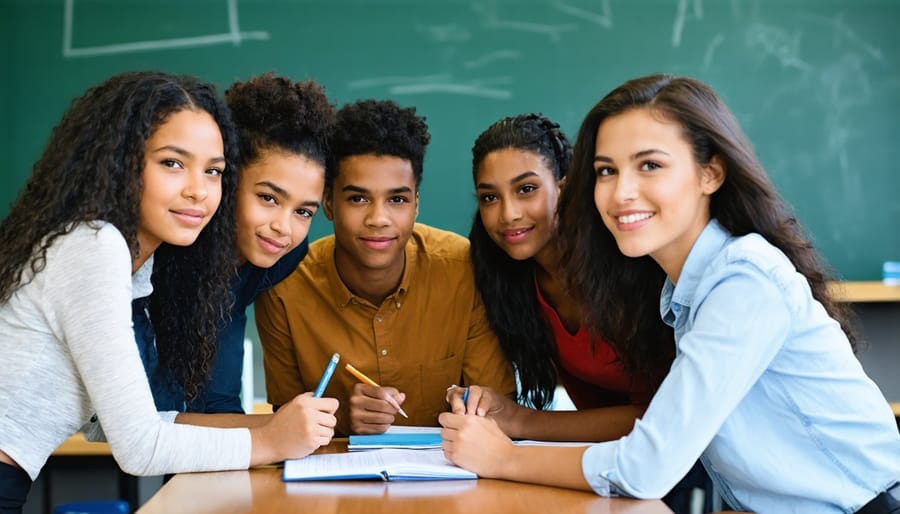In the dynamic world of education, the relationship between students and teachers forms the cornerstone of effective learning environments. This symbiotic partnership transcends traditional classroom boundaries, evolving into a complex interplay of knowledge exchange, mentorship, and mutual growth. When fostered correctly, this relationship can transform educational outcomes and create lasting positive impacts on both parties involved.
The modern educational landscape demands more from this partnership than ever before. Students arrive in classrooms with diverse learning styles, varying cultural backgrounds, and a range of technological proficiencies. Meanwhile, teachers must navigate increasingly complex curricular requirements while addressing individual learning needs and incorporating new pedagogical approaches.
Effective communication serves as the foundation of successful educational partnerships. When young learners feel heard and valued, they develop the confidence to participate actively in their educational journey. Educators who create safe spaces for expression find that classroom engagement increases substantially, leading to improved academic outcomes and stronger communities of practice.
Research consistently demonstrates that mutual respect dramatically enhances learning outcomes. When educators recognize and honor the unique perspectives that each young person brings to the classroom, they cultivate an environment where authentic learning can flourish. Similarly, when young learners approach their educational guides with respect and openness, they position themselves to absorb knowledge more effectively.
The digital revolution has fundamentally transformed how these educational partnerships function. Virtual learning environments, educational technology, and online resources have expanded the possibilities for interaction beyond traditional classroom walls. These technological advances offer exciting opportunities while simultaneously presenting new challenges for maintaining meaningful connections.
Personalized learning approaches have gained significant traction in recent years, emphasizing the importance of tailoring educational experiences to individual needs. Progressive educators recognize that standardized approaches often fail to address the unique learning profiles of those in their classrooms. By adapting teaching strategies to accommodate diverse learning styles, these dedicated professionals can more effectively engage each young person.
Emotional intelligence plays an increasingly important role in education. The ability to recognize, understand, and manage emotions—both one’s own and those of others—contributes significantly to productive learning environments. When educational guides model emotional intelligence, they provide valuable life skills that extend far beyond academic content.
Collaborative learning environments foster rich educational partnerships. When young learners work together on projects, engage in peer teaching, and participate in group discussions, they develop crucial social skills while reinforcing their understanding of academic content. Skilled education professionals understand how to facilitate these collaborative experiences effectively.
Feedback mechanisms represent another crucial component of successful educational relationships. Constructive, timely feedback helps young learners identify areas for improvement while recognizing their strengths. Effective education professionals provide feedback that is specific, actionable, and delivered with empathy.
The impact of positive educational relationships extends well beyond academic achievement. Young people who experience supportive connections with their educational guides often demonstrate improved self-confidence, greater resilience, and stronger critical thinking skills. These benefits can influence life outcomes far into the future.
Challenges inevitably arise within these complex relationships. Resource limitations, administrative constraints, and external pressures can strain even the most dedicated educational partnerships. Successfully navigating these challenges requires flexibility, communication, and a shared commitment to educational goals.
Cultural competence significantly enhances educational relationships. As classrooms become increasingly diverse, education professionals must develop the skills to understand, respect, and incorporate different cultural perspectives. This cultural awareness creates more inclusive learning environments where all young people can thrive.
Professional development plays a vital role in strengthening educational partnerships. When education professionals continuously enhance their skills and knowledge, they bring fresh perspectives and effective strategies to their interactions with young learners. This ongoing growth benefits everyone involved in the educational process.
Family involvement further enriches educational relationships. When families partner with education professionals, they create a supportive network that reinforces learning objectives and provides consistent guidance. Effective education professionals recognize the value of these broader partnerships and actively work to foster family engagement.
Looking toward the future, educational partnerships will continue to evolve in response to changing societal needs, technological advancements, and emerging pedagogical approaches. The fundamental importance of strong relationships between young learners and their educational guides, however, remains constant. By investing in these essential connections, we invest in the future of education itself.
Ultimately, the most successful educational partnerships balance structure with flexibility, challenge with support, and tradition with innovation. When young learners and their educational guides work together in an atmosphere of mutual respect and shared purpose, they create powerful learning experiences that can transform lives.
Classroom Dynamics: Fostering Meaningful Educational Relationships
The intricate dance of classroom dynamics shapes educational experiences in profound ways. At the heart of these dynamics lies the relationship between students and teachers, a connection that determines much about the quality and effectiveness of learning. Understanding and nurturing this relationship can transform ordinary educational experiences into extraordinary journeys of discovery and growth.
In today’s rapidly evolving educational landscape, students bring diverse expectations, learning styles, and backgrounds to the classroom. Simultaneously, teachers face mounting pressures to meet standardized benchmarks while providing personalized learning experiences. Navigating these complexities requires intentional relationship-building and thoughtful attention to classroom climate.
Trust serves as the foundation for productive classroom relationships. When young learners feel safe to take intellectual risks, ask questions, and express confusion, genuine learning flourishes. Educational guides who consistently demonstrate reliability, fairness, and authenticity create environments where this essential trust can develop naturally over time.
Clear expectations contribute significantly to positive classroom dynamics. When educational guides articulate academic and behavioral standards explicitly, young learners gain a sense of security and direction. These clear parameters create a framework within which creative exploration and authentic engagement can thrive without devolving into chaos or confusion.
Engagement strategies play a crucial role in fostering meaningful educational relationships. Interactive teaching methods, relevant curriculum connections, and opportunities for student voice all contribute to classrooms where young learners feel invested in their educational journey. Skilled education professionals continuously refine these engagement approaches based on the specific needs and interests of those in their care.
The physical environment itself influences classroom dynamics in subtle but significant ways. Thoughtful arrangement of learning spaces, incorporation of student work, and attention to sensory elements all contribute to atmospheres conducive to positive relationships. Progressive educational guides recognize the classroom environment as a powerful teaching tool that silently communicates values and expectations.
Conflict resolution skills prove essential in maintaining healthy classroom dynamics. Disagreements inevitably arise in learning communities, but these moments offer valuable opportunities for growth when handled constructively. Education professionals who model and teach effective conflict resolution strategies equip young learners with valuable life skills while preserving positive classroom relationships.
Cultural awareness enhances understanding between diverse classroom participants. Educational guides who take time to learn about and honor the varied cultural backgrounds represented in their classrooms build bridges of understanding that strengthen the entire learning community. This cultural responsiveness creates more inclusive environments where all young learners can thrive.
Humor, when used appropriately, can significantly enhance classroom relationships. Shared laughter creates bonds, reduces tension, and makes learning more enjoyable for everyone involved. Skilled education professionals understand how to incorporate playfulness into their teaching without undermining the seriousness of educational purposes.
Differentiated approaches acknowledge the unique learning profiles present in every classroom. By offering multiple pathways to understanding, educational guides demonstrate respect for the individuality of each young person. This personalization strengthens relationships by communicating genuine concern for individual success rather than rigid adherence to standardized methods.
Technology integration continues to reshape classroom dynamics in both challenging and promising ways. Digital tools offer unprecedented opportunities for collaboration, creative expression, and global connection. However, thoughtful implementation remains essential to ensure technology enhances rather than diminishes meaningful human relationships in educational settings.
Mindfulness practices have gained recognition for their positive impact on classroom climate. When educational guides incorporate brief moments for centering, reflection, and present-moment awareness, they help young learners develop self-regulation skills while creating calmer, more focused learning environments. These practices benefit everyone involved in the educational partnership.
Assessment approaches significantly influence the relationship between young learners and their educational guides. When evaluation methods emphasize growth over comparison and provide specific, constructive feedback, they strengthen rather than damage educational relationships. Forward-thinking education professionals continually refine their assessment practices to ensure they support rather than undermine positive classroom dynamics.
Community-building activities establish connections that enhance learning experiences. Morning meetings, collaborative projects, and classroom traditions create shared experiences that bond educational communities together. These intentional community-building efforts yield dividends in increased engagement, improved behavior, and more productive learning partnerships.
The broader school culture inevitably influences individual classroom dynamics. When educational institutions prioritize relationship-building, provide adequate support systems, and maintain reasonable expectations, they create conditions where positive classroom relationships can flourish. Thoughtful educational guides recognize these contextual factors while working to create optimal conditions within their specific learning communities.
Ultimately, the quality of relationships between young learners and their educational guides remains one of the most significant predictors of educational success. By attending thoughtfully to classroom dynamics, education professionals create environments where authentic learning, personal growth, and mutual respect can flourish. These efforts yield benefits that extend far beyond academic achievement, influencing life trajectories in profound and lasting ways.

